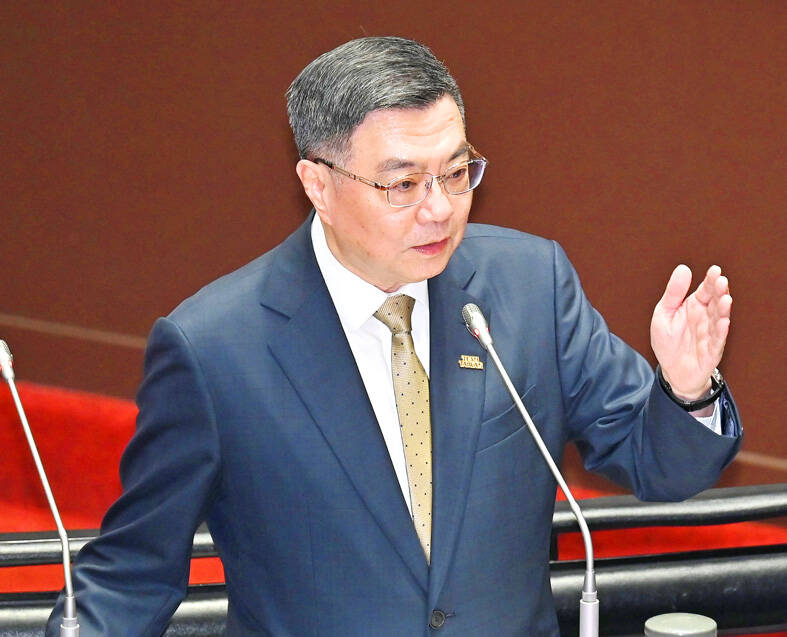The 32 percent tariff US President Donald Trump announced last week for Taiwan is considered “extremely high,” so the government has proposed a NT$88 billion (US$2.69 billion) support package for the worst-case scenario, Premier Cho Jung-tai (卓榮泰) said in a presentation at the legislature on Friday.
A tariff of 30 percent or higher would have the most significant impact among the three scenarios for which the government had drafted responses, he said.
The “low” tariff scenario would have been a 10 percent to 20 percent levy, which would have had a manageable impact on local industries and its support plan would have cost NT$36.1 billion, Cho said.

Photo: Tu Chien-jung, Taipei Times
The “high” tariff scenario was a 20 percent to 30 percent duty, which would have had a high risk of impacting manufacturing sectors such as machinery and electronics, and the exports of agricultural and fishery products, which would have needed a support plan of about NT$57.6 billion, he said.
The “reciprocal” tariffs for countries the US has a trade deficit with were scheduled to take effect on Wednesday last week, but Trump announced a 90-day pause on the new measures, while retaining the 10 percent duties imposed last Saturday on nearly all countries and territories.
The 32 percent tariff for Taiwan is higher than the 24 percent and 25 percent duty set for Japan and South Korea respectively.
The nation is expected to see a drop of at least 21 percent in the value of goods shipped to the US, as US buyers are to see higher prices for products from Taiwan.
To avoid US clients placing orders with competitors in other countries, Taiwanese businesses would have to consider moving manufacturing to locations abroad to stay competitive in the global market, Cho said.
The local manufacturing sector is likely to see a 5 percent drop in production value, and 125,000 jobs could be at stake, he said.
The agricultural sector would also be hit by the sweeping 32 percent tariff, because of the added cost of exporting products to the US, estimated at NT$320 million for orchids, NT$460 million for tilapia and NT$110 million for mahi-mahi, or dolphin fish, Cho said.
Cho hoped to obtain lawmakers’ support for the administration’s NT$88 billion proposal, which aimed to mitigate the tariff’s impact over a four-year period.
The support plans would be funded through a special budget and requires legislative approval.
In addition to the proposed plans and trade negotiations with the US, the government would also tackle other trade issues, including export controls on advanced technology and Chinese products “dumped” on the US market through a third country, such as Taiwan and Vietnam, he said.
As the US has imposed 145 percent tariffs on China, the government would also prevent China from “dumping” cheap products in markets outside the US, including Taiwan, he added.

DEFENSE: The National Security Bureau promised to expand communication and intelligence cooperation with global partners and enhance its strategic analytical skills China has not only increased military exercises and “gray zone” tactics against Taiwan this year, but also continues to recruit military personnel for espionage, the National Security Bureau (NSB) said yesterday in a report to the Legislative Yuan. The bureau submitted the report ahead of NSB Director-General Tsai Ming-yen’s (蔡明彥) appearance before the Foreign and National Defense Committee today. Last year, the Chinese People’s Liberation Army (PLA) conducted “Joint Sword-2024A and B” military exercises targeting Taiwan and carried out 40 combat readiness patrols, the bureau said. In addition, Chinese military aircraft entered Taiwan’s airspace 3,070 times last year, up about

A magnitude 4.3 earthquake struck eastern Taiwan's Hualien County at 8:31am today, according to the Central Weather Administration (CWA). The epicenter of the temblor was located in Hualien County, about 70.3 kilometers south southwest of Hualien County Hall, at a depth of 23.2km, according to the administration. There were no immediate reports of damage resulting from the quake. The earthquake's intensity, which gauges the actual effect of a temblor, was highest in Taitung County, where it measured 3 on Taiwan's 7-tier intensity scale. The quake also measured an intensity of 2 in Hualien and Nantou counties, the CWA said.

The Overseas Community Affairs Council (OCAC) yesterday announced a fundraising campaign to support survivors of the magnitude 7.7 earthquake that struck Myanmar on March 28, with two prayer events scheduled in Taipei and Taichung later this week. “While initial rescue operations have concluded [in Myanmar], many survivors are now facing increasingly difficult living conditions,” OCAC Minister Hsu Chia-ching (徐佳青) told a news conference in Taipei. The fundraising campaign, which runs through May 31, is focused on supporting the reconstruction of damaged overseas compatriot schools, assisting students from Myanmar in Taiwan, and providing essential items, such as drinking water, food and medical supplies,

New Party Deputy Secretary-General You Chih-pin (游智彬) this morning went to the National Immigration Agency (NIA) to “turn himself in” after being notified that he had failed to provide proof of having renounced his Chinese household registration. He was one of more than 10,000 naturalized Taiwanese citizens from China who were informed by the NIA that their Taiwanese citizenship might be revoked if they fail to provide the proof in three months, people familiar with the matter said. You said he has proof that he had renounced his Chinese household registration and demanded the NIA provide proof that he still had Chinese